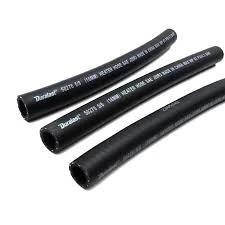ethanol rubber fuel lines
Sep . 15, 2024 02:39 Back to list
ethanol rubber fuel lines
Ethanol and Its Impact on Rubber Fuel Lines
Ethanol, a renewable biofuel derived primarily from corn and sugarcane, has become increasingly popular as an additive in gasoline. In many regions, fuels containing up to 10% ethanol (E10) or more are common. While blending ethanol with gasoline offers benefits such as reduced carbon emissions and enhanced octane ratings, it can have significant repercussions for rubber fuel lines in vehicles.
Ethanol and Its Impact on Rubber Fuel Lines
As ethanol content in gasoline increases, manufacturers have recognized the need for more resilient materials. Some fuel line manufacturers are now producing lines specifically designed to resist the detrimental effects of ethanol. These lines often utilize fluorinated elastomers or other advanced materials that demonstrate superior compatibility and longevity in the presence of ethanol. Such innovations are essential in ensuring the safety and reliability of vehicles that operate on ethanol-blended fuels.
ethanol rubber fuel lines

Moreover, the compatibility of fuel lines with ethanol is crucial not only for vehicle performance but also for environmental concerns. Fuel leaks can lead to hazardous spills, contaminating soil and groundwater. As the automotive industry shifts toward more sustainable energy solutions, understanding the effects of ethanol on vehicle components, including rubber fuel lines, is becoming increasingly important.
For vehicle owners, it is advisable to be aware of the ethanol content in the fuel they use and to ensure that their vehicle's fuel systems are compatible with it. Regular inspections of fuel lines and other exposed components can help identify early signs of wear and tear. Should any degradation be detected, it’s wise to replace rubber fuel lines with ethanol-compatible alternatives to prevent potential leaks and ensure safe operation.
In conclusion, while ethanol offers numerous advantages as a fuel additive, its effects on rubber fuel lines cannot be ignored. Advances in material technology are helping to mitigate these issues, but consumer awareness and regular maintenance remain key in managing the risks associated with ethanol-blended fuels. Keeping vehicles well-maintained is essential for performance, safety, and sustainability in our increasingly eco-conscious world.
